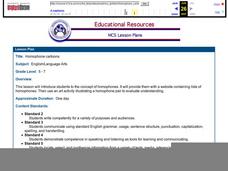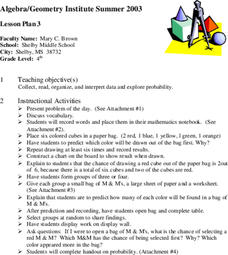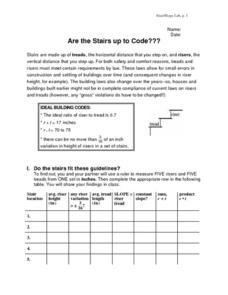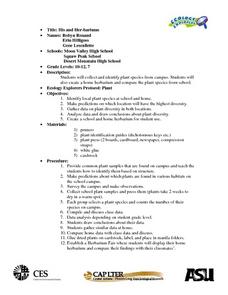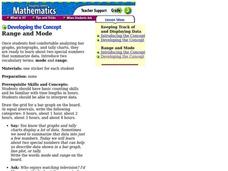Curated OER
Homophone Cartoons
A terrific lesson on homophones awaits your youngsters. First, pupils access a website that contains lists of homophones. Then, it's time to get creative! Everyone gets a piece of poster board and they create a homophone cartoon -...
Chemical Education Foundation
Teacher's Guide to Science Projects
Do you find the idea of having a science fair with all of your students intimidating? Use a guide that provides everything you need to know to make project-based learning manageable. The resource includes options for four different types...
National Wildlife Federation
Green Green Revolution
School budgets don't have a lot of extra money, so when students propose saving the district money, everyone jumps on board. The first lesson in the series of 21 introduces the concept of an energy audit. Scholars form an eco-action team...
Constitutional Rights Foundation
U.S. Immigration Policy and Hitler’s Holocaust
Though the Statue of Liberty welcomes political refugees to her shores, the welcoming sentiment has not always been reflected in the American citizenry. High schoolers read about the regrettable period in United States history when the...
Curated OER
The Girl Who Loved Wild Horses
Second graders use literature journals and discussion groups to summarize and improve their reading comprehension. For this reading skills lesson, 2nd graders discuss animals they've loved and read the story The Girl Who Loved Wild...
Curated OER
Seed Germination
Students explore plants and the scientific method. In this plant growth lesson, students follow the steps in the scientific method to perform a seed germination experiment as a whole class. Students work in a group to create their own...
Curated OER
Successful Resource-based Learning Strategies for the Geography of Canada Course
Young scholars conduct a statistical research project on population changes. They evaluate demographic issues, such as the size and location of native people. immigrant groups, and the age and gender of the population.
Curated OER
Exploring Probability
Fourth graders participate in a lesson that explores probability. They use candy and model cubes to experiment with different outcomes that can be charted if the students can proceed to the objective of the lesson. They discover how...
University of Colorado
Looking Inside Planets
All of the gas giant's atmospheres consist of hydrogen and helium, the same gases that make up all stars. The third in a series of 22, the activity challenges pupils to make scale models of the interiors of planets in order to...
Curated OER
Get On Board
Students create a ticket table illustrating the cost of tickets by alternative transportation. In this number sense lesson, students write number sentences to compare and contrast difference information in their chart. Students figure...
Curated OER
Bird Beak Buffet
Students complete an activity that allows them to better understand that birds traits are closely related to what they eat, where they live, etc. In this bird trait lesson plan students complete an activity, create a data board and...
Curated OER
Macbeth Madness
Students research Macbeth online and complete computer and graphing activities for the play. In this Macbeth activities lesson, students research Macbeth and bookmark the URL's. Students complete activities for the topic on spreadsheets...
Curated OER
The Correlation Between Human Population Growth and Dwindling Natural Resources
Eighth graders predict human population growth. In this lesson, 8th graders discuss the length of time needed to double the human population, work in groups to chart population growth and predict population growth in the...
Curated OER
Kansas Foods A Data and Probability Investigation
Students study a number of food products and anticipate which are derived from Kansas crops. They make a list of words associated with the food stuffs and graph the results.
American Chemical Society
Using Color to See How Liquids Combine
Blue-tinted water is added to unknown liquids that have been tinted yellow to find out how they interact. This is a memorable activity that is part of an investigation on the properties of liquids, which is part of a unit on the...
Curated OER
Stairs and Slope
In this stairs and slope activity, 11th graders solve and complete 12 various problems that include identifying stairs that meet the given guidelines using slope. First, they use a ruler to measure the risers and treads from one set of...
Physics Classroom
All Work and No Play Lab
Don't let the term, "slotted wood board" detract you from the value of this experiment. Class members tie a string to a cart and, with even horizontal force, drag it up an inclined plane. The objective is to compare the work done with...
Curated OER
Science: Her-bariums Galore!
Students collect and identify plant species and construct herbariums both at school and at home. By gathering data from both locales, they draw conclusions and make predictions about plant diversity. Upon completion of the exercises,...
Curated OER
Range and Mode
Fifth graders interpret data. In this mode and range lesson, 5th graders define mode and range and practice finding them given a set of data.
Curated OER
Mathematics Within: Bar And Pie Graphs
Students compare and contrast the use of bar and pie graphs with the same data. They create a data set by surveying all students in the class using sticky notes to make a table on the board. Then, each student creates a bar and pie graph...
Curated OER
Mean Averages
Fourth graders examine a number of data sets while practicing finding the mean, median, and mode of the numbers.
Curated OER
Density Destiny
Sixth graders measure and investigate the densities of several objects. They, in teams, determine the mass and volume of each of the 5 objects and record the measurements in the data table.
Curated OER
Choosing the Best Graph
Eighth graders produce and examine two sets of data and create what they believe to be the most appropriate graphs to represent these sets of data. After completing the pre-assessment, they discuss reasons for using each type of graph...
Curated OER
Census Sensibility
Young scholars examine the importance of the census and census data collection methods. They gather statistical data, create graphs comparing state and national populations, and compose written reflections on why the census is necessary.


